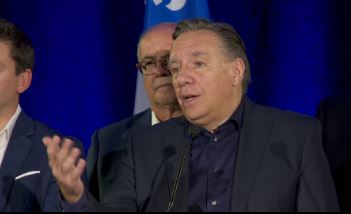Premier François Legault calls them his “dream team.”

When the new parliamentary session begins on Tuesday, the 75 Coalition Avenir Quebec (CAQ) MNAs will hit the ground running, with promises to bring in a range of new legislation.
The CAQ also wants to make sure Quebecers know that among some of the busiest MNAs in their caucus are women.
“We have strong women that have very important ministries,” Isabelle Charest, minister for the status of women, said Friday morning, before heading into the second day of the CAQ pre-session caucus in Rivière-du-Loup.
READ MORE: Quebec elects record number of women candidates in Canada: analysts
Charest and three other female cabinet ministers — Justice Minister Sonia LeBel, Health Minister Danielle McCann and Public Security Minister Geneviève Guilbault — came out together to address reporters covering the two-day CAQ caucus.
“We’re here to say that we work well together and that women have a strong place in the government,” Charest said.
The women were responding to a Friday press release from Quebec Solidaire that accused the government of minimizing the role of women in the CAQ caucus.
“The glass ceiling is still very much in place in the National Assembly,” the release reads in part.
READ MORE: Men outearn women in Legault’s caucus
Quebec Solidaire also suggests that male cabinet ministers speak more during Question Period and are paid higher salaries. A recent article by the Canadian Press also found that men outearn the women.
The article found that 23 women have extra roles that earn them a top-up in pay, while 42 men have extra functions. For example, the National Assembly president, caucus president, chief whip, and parliamentary leader are all men.

Get daily National news
However, Charest and the other female cabinet ministers contest these figures. According to their calculations, they say that on average, CAQ MNAs who are women make more than the men ($136,461 per year compared to $133,135).
“We’re not fighting a battle of numbers. We’re just saying to you that we are very satisfied with the way we’re working. We have a strong place, a strong voice and we can make our voice heard whenever it is necessary,” LeBel said.
READ MORE: Feds should offer cash incentives to parties to get more women in politics: committee
Premier Legault also stressed the role of the women MNAs and cabinet ministers in his caucus during a Friday afternoon press conference.
“The government has elected the most women (in history),” he said. “Health, the most important portfolio, is occupied by a woman.”
In support of Legault’s argument, many of the government’s top priorities heading into the fall session will be headed up by women. McCann will work to reduce wait times in emergency rooms by creating more access for patients in clinics, while the minister responsible for seniors, Marguerite Blais will continue to develop the government’s campaign promise to create state-of-the-art, modern seniors homes.
Guilbault has already announced that she will name a new chief of the province’s anti-corruption unit, UPAC. She also said she is working on a project to fix policing in Quebec — not a small task, given recent problems plaguing the province’s police forces.
READ MORE: Philippe Pichet suspended; SQ head takes over SPVM
Sonia LeBel will also table legislation this fall to bring in electoral reform.
Along with the Parti Quebecois and Quebec Solidaire, the CAQ promised to bring in mixed-member proportional representation, which will give more seats to parties based on the popular vote. However, the justice minister said the government won’t bring in the reform before the next provincial election in 2022.
“The DGEQ (Elections Quebec) said it was not something that was so easy to put in place, we have to understand that. It’s a major turnover. So let’s just take the time. We will do it, let’s just take the time to do it properly,” she said.
READ MORE: CAQ government could soon change the way Quebec votes
Of course, some men will also have crucial roles: Jean- François Roberge is charged with passing a bill to bring in province-wide pre-kindergarten and he will soon table controversial legislation to abolish school boards.
Immigration Minister Simon Jolin-Barrette has recently taken over the French language portfolio, which Legault also said would be a major priority in the next session.
Legault also warned Quebecers that the surplus his government inherited from the outgoing Liberals is almost all run dry. That’s because the government has used it to fufil its campaign promises, like targeted tax breaks for families and businesses.
“I’m going to be very clear with Quebecers. I’m going to be very clear with municipalities. There is no wiggle room,” he said.
Legault also warned unions that the government will be a tough negotiator in upcoming collective bargaining discussion, but he confirmed that orderlies in long-term care homes and early-career teachers can expect slight wage increases.
WATCH: (Sept. 12, 2019) Fate of Quebec English school boards still up in the air









Comments
Want to discuss? Please read our Commenting Policy first.